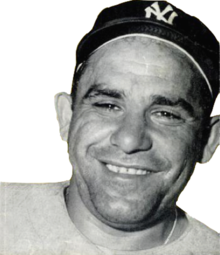Was there ever a baseball personality that was as beloved, and as much a part of the American story, as Yogi Berra?
It went beyond baseball. We loved Yogi Berra not only for his playing and managerial ability, but for the quips, malapropisms, and deliciously awkward things that came out of his mouth.
Perhaps it was ironic that Yogi died on Yom Kippur — on the fiftieth anniversary of Sandy Koufax’s refusal to pitch in the World Series. No, Yogi Berra certainly wasn’t Jewish, though he had attended not a few Yom Kippur break fasts over the years.
My friend, Rabbi Steven Kushner, often saw him at those break fasts; at one of them, Yogi took my friend’s late mother’s hand and escorted her to the car. “What a sweet man he was — completely unassuming. You would see him all over Montclair, at restaurants and bookstores, and you could easily talk with him. What a mensch!” says Rabbi Kushner.
For someone who wasn’t Jewish, some of Yogi Berra’s bon mots had irrepressible traces of Jewish wisdom imbedded within them. Here is a taste.
“It’s deja vu all over again.” Jewish history is proof of that.
For example:
- The cycle of comfort, acculturation, and persecution that exists in many Diaspora communities.
- Jewish creativity and stagnation, that has happened over the centuries.
- The cycle of internal Jewish debate and reform — going all the way back to the prophets, and to the early rabbis, and the medieval philosophers, and the mystics, and the reformers of the last two hundred years.
- The way that Jews have confronted the world in which they live in — either accepting the world whole-heartedly (a.k.a. assimilation), or rejecting it stubbornly (a.k.a. Jewish “fundamentalism”), or creatively encountering it, changing what is necessary while holding onto ancient truths (a.k.a. non-Orthodoxy — and, come to think of it, modern Orthodoxy as well).
“The future ain’t what it used to be.” Predictions don’t always work out the way we think.
Consider the 1981 bestseller Megatrends, by John Naisbitt. Much of what Naisbitt predicted came true — a demographic shift from North to South; the rise of networking; the growth of diverse options in society.
He did, however, fail to predict the biggest megatrend of the last five hundred years — the rise of the Internet.
(Rabbi Sid Schwarz has edited an excellent volume that sketches a vision for the Judaism and Jewish community of the coming decades. Time will tell whether its visions will know the test of time.)
So, too, with the Jews. Many of the past few decades’ direst predictions about Jewish life simply have not come to pass.
Thirty years ago, Rabbi Yitz Greenberg predicted that there would no longer be one Jewish people in the year 2000. It has not happened that way.
But, in fact, there is no longer one Judaism — if there ever was. We have seen an explosion of new Jewish options — New Age Judaisms, etc. No one predicted the growth of the Muslim population in the United States. Neither did anyone predict the revival of anti-Semitism in Europe.
Yogi’s quip about the future of the future reminds us all to be just a little bit more humble.
“When you come to a fork in the road, take it.” That is certainly the case, both with American Judaism, and with American Jews. The forks in the road include: synagogues that do the same old thing the same old way, and those that are willing to experiment; those who are passionate about their support for Israel, and those who don’t want to engage at all; those whose Judaism is in the future, and those whose Judaism is tied to a nostalgic, ethnic past.
Basically, there are only two movements in American Judaism today: those who care, and those who don’t care. That is the ultimate fork in the Jewish road.
You should always go to other people’s funerals, otherwise, they won’t come to yours.” Thank you, Yogi, for reminding us of the the mitzvah of leviat ha-meit (accompanying the dead for burial).
Except Yogi got it precisely backwards: the true beauty of attending funerals, and even helping to bury the dead by shoveling dirt into the grave, is that it is a final kindness for which there can truly be no “payback.” It reminds us that there are certain things that we do that are so precious, and so holy, that we do them simply — because.
“It ain’t over till it’s over.” Many people said this after Yogi Berra died.
But, from both a Jewish and a Christian point of view (not to mention Muslim), it is not exactly true. Even when our lives are over, something remains – memories, the good things we did (even the not-so-good things that we have done), or what many religious people call the soul.
Where does the soul ultimately come to reside? People have been discussing this, and arguing about this, for millennia.
Suffice it to say that it ain’t over even when we think it’s over – and all of Yogi’s fans and admirers will affirm that.
Yogi Berra’s life and influence will never be over. Wherever and whenever people come up with malapropisms and self-evident, ironic sayings, Yogi Berra will live again.






